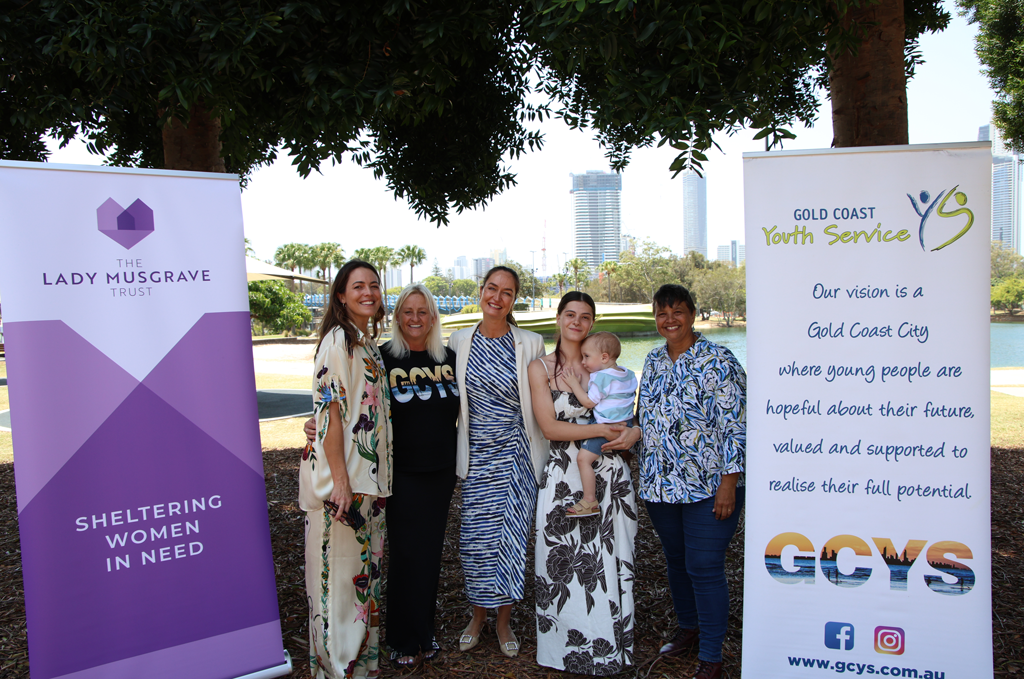Our Impact
Real homes. Real hope. Real change.
Our Impact
We change the lives of Queensland women and their children every day.
Home » Our Impact
Every day, The Lady Musgrave Trust helps Queensland women and their children leave housing insecurity and safety concerns behind and build a safer, stronger future.
Since 1885, we’ve provided practical, life-saving support to women experiencing or at risk of homelessness. Today, our impact is felt through a combination of safe, supported housing, service navigation and information tools that empower women to take the next step.
Our approach is evidence-based and outcome-driven. We focus on providing:
- Stable and safe housing
- Access to education and employment
- Support to navigate complex service systems
These are the building blocks of long-term safety, wellbeing and independence.
Our goal is for every tenant to successfully transition into private rental housing – with the life skills and support networks to maintain it.
Victoria Parker Chief Executive Officer The Lady Musgrave Trust
How we made a difference in the 2024/2025 financial year
Provided more than 12,000 nights of accommodation
to Queensland women and their children who are experiencing or at risk of homelessness.
Provided 15 accommodation units
to house young women (and their children) in need, resulting in around 50 people each year being safely housed.
Delivered and continued to support two editions of the handy guide
one for Brisbane, Ipswich, Logan and the Redlands Coast, and one for Regional Queensland. The new editions of the Guide launched in early 2024. More than 38,000 hard copies have been distributed since their release.
Opened jinndii waijung, our major building project to house young women and their children in logan
four mothers and their children moved into their new homes in March 2025. This project has been delivered with the assistance of the Queensland Government and other generous partners.
Subsidised more than $50,000 rent
for Queensland women and children in need.
Assisted thousands of organisations across queensland
to access additional services for clients through the online edition of The Handy Guide.
Connected women to nearly 1,000 services
including accommodation, healthcare, support agencies, legal and financial advice and more.
Delivered our 16th annual women and homelessness forum
highlighting the pathways out of homelessness. The event was a full house and the online content has received over 2,000 views.
Expanded individualised case management support to 55% of our tenant population
to enable tenants to build practical life skills and work towards enhanced employment, education and training outcomes. We are aiming to provide 100% of our tenants with support by 31 December 2025.
Strengthened our funding eco-system and organisational infrastructure
including our governance, financial transparency and risk evaluation procedures, to enhance the impact we have with our partners and supporters for the benefit of young vulnerable women and their children.
Coordinated hundreds of hours of volunteer support
including our dedicated Board members, corporate partners, and committed members of the community assisting at events; participating in meetings, working groups and charity gift wrapping; donating to, sorting and wrapping Christmas Hampers; and many other activities. A highlight was our working bees with our partners to turn Jinndii Waijung properties into welcoming homes.
Continued our strong and mutually beneficial relationships
with BDO, Corporate Travel Management, Hand Heart Pocket, HopgoodGanim Lawyers, Morgans and Brisbane Markets Ltd, to name a few. Our partners are key to initiatives aimed at reducing the number of young women experiencing homelessness in Queensland. Without them, we would not be able to deliver the impacts we’re so proud of.
On 6 june 2025, as part of queensland day celebrations, the hon david crisafulli mp, premier of queensland, officially presented the queensland greats (institution) award to the lady musgrave trust.
In receiving this honour, The Trust joins the ranks of Queensland icons, past and present, who embody the state’s spirit of resilience, identity and community strength. In its 140-year history, The Lady Musgrave Trust has helped nearly 15,000 women and children into safe, supported housing, provided over one million nights of accommodation, and connected thousands more to critical services and resources through The Handy Guide, a comprehensive directory that helps vulnerable women in crisis access support, including emergency accommodation. The Lady Musgrave Trust is very proud of this recognition of the work of our partners, supporters and volunteers in combating homelessness.
For detailed information about how The Lady Musgrave Trust supports women in need, see our latest Annual Report below. This six month report has been developed as we transition our annual reporting from a calendar year to a financial year.
Housing that heals. Support that transforms
Our supported housing model gives women and children more than a roof over their heads – it gives them a foundation to heal, grow and thrive.
Each woman we support is on her own journey, but the outcomes speak for themselves:
- Increased wellbeing and confidence
- Stronger connections with employment and education
- Greater engagement with community and support services
- Safer futures for the next generation

Why this work matters
Domestic and family violence is the number one driver of homelessness for women and children in Australia. The need is urgent – and growing.
- Family and domestic violence is the leading cause of homelessness for women and children in Australia.
- Approximately 1 in 4 Australian women (23%) have experienced violence by an intimate partner since the age of 15.
- Around 10,000 women in Queensland are homeless at any given time.
- The risks, housing insecurity and poverty women experience after leaving violence often result in them returning to a violent partner.
- Females make up 44.1% of all people experiencing homelessness in Australia.
- In 2023, Queensland Police responded to approximately 192,000 domestic and family violence occurrences, marking a 12% increase from the previous year.
Homelessness doesn’t discriminate. Most women who experience domestic and family violence are employed. Many are mothers. All deserve safety and support.

Help us expand our impact
We’re building more homes, supporting more women and creating real pathways out of homelessness.

The Cost of Inaction
Our community needs to raise our commitment to ensuring that affordable housing is available to all as a basic human right.
Failure to act to solve homelessness will cost the Australian community $25 Billion per year by 2051.
Increased unstable housing costs impacts on companies/businesses’ ability to find, train and retain staff.
The costs to society of housing instability include:
- Entrenched inter-generational disadvantage
- Domestic and family violence, costs and suffering associated with crime
- Wasted opportunity costs associated with underutilised human capital
- Lack of education benefits
- Under-realised labour market productivity




